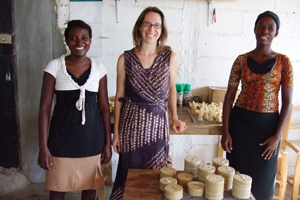Lighting a Candle for Social Entrepreneurship

Siiri Morley, Heller MBA’10 (center)
Few entrepreneurs see Rwanda, Afghanistan or the Congo as places they hope to expand into. But when your business is designed to help women in distressed or war-ravaged countries rebuild their lives and thrive, places like these suddenly seem like shrewd choices.
Over the next decade, social entrepreneur Siiri Morley, Heller MBA’10, intends to add this trio of countries to the base of operations for her mission-driven for-profit company, Prosperity Candle. Launched in 2010, Prosperity Candle trains women to become independent entrepreneurs who make and sell high-quality candles and specialty gifts, both locally and through the company’s U.S. sales.
Last year, Morley also launched Prosperity Catalyst, a sister nonprofit focused on galvanizing resources and individuals to support women’s entrepreneurship in conflict zones.
Prosperity Candle’s website actually encourages Internet buyers to connect with the “chandler” who crafted their candle. Luma, for instance, is a young woman living with her parents in Baghdad. Twenty-six-year-old Landie lives in Haiti; she’s raising money to send her three children to school.
Why a business model that focuses exclusively on women? Women entrepreneurs invest in their family’s lives, as well as in growing their business, says Morley. As a result, their children gain greater access to education, get better nourishment, and have a chance at a healthier and more prosperous future. And gender-based violence declines when women have economic opportunity, she adds.
“As a woman, I feel so lucky to have been born into a family that believes in education,” Morley says. “I want to give back to those who weren’t born into the circumstances I was.”
Morley teamed up with Ted Barber and Amber Chand to found Prosperity Candle while she was still a Heller student, devoting several class projects and a summer internship to getting the company off the ground.
Though not yet profitable — “We’re still bootstrapping,” says Morley — the company has trained more than 40 women in Baghdad as well as six Burmese and Bhutanese refugees who have resettled in Springfield, Mass. They are now setting out to train another 10 or more in Haiti.
The daughter of two Peace Corps volunteers, Morley herself spent three years in Lesotho with the Peace Corps, working on a women’s weaving project. She later participated in various international-development and fair-trade projects throughout the developing world.
Social entrepreneurship seems to be in her DNA, and her ROI.
Over the next decade, social entrepreneur Siiri Morley, Heller MBA’10, intends to add this trio of countries to the base of operations for her mission-driven for-profit company, Prosperity Candle. Launched in 2010, Prosperity Candle trains women to become independent entrepreneurs who make and sell high-quality candles and specialty gifts, both locally and through the company’s U.S. sales.
Last year, Morley also launched Prosperity Catalyst, a sister nonprofit focused on galvanizing resources and individuals to support women’s entrepreneurship in conflict zones.
Prosperity Candle’s website actually encourages Internet buyers to connect with the “chandler” who crafted their candle. Luma, for instance, is a young woman living with her parents in Baghdad. Twenty-six-year-old Landie lives in Haiti; she’s raising money to send her three children to school.
Why a business model that focuses exclusively on women? Women entrepreneurs invest in their family’s lives, as well as in growing their business, says Morley. As a result, their children gain greater access to education, get better nourishment, and have a chance at a healthier and more prosperous future. And gender-based violence declines when women have economic opportunity, she adds.
“As a woman, I feel so lucky to have been born into a family that believes in education,” Morley says. “I want to give back to those who weren’t born into the circumstances I was.”
Morley teamed up with Ted Barber and Amber Chand to found Prosperity Candle while she was still a Heller student, devoting several class projects and a summer internship to getting the company off the ground.
Though not yet profitable — “We’re still bootstrapping,” says Morley — the company has trained more than 40 women in Baghdad as well as six Burmese and Bhutanese refugees who have resettled in Springfield, Mass. They are now setting out to train another 10 or more in Haiti.
The daughter of two Peace Corps volunteers, Morley herself spent three years in Lesotho with the Peace Corps, working on a women’s weaving project. She later participated in various international-development and fair-trade projects throughout the developing world.
Social entrepreneurship seems to be in her DNA, and her ROI.
— Laura Gardner, P’12
